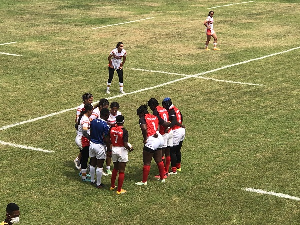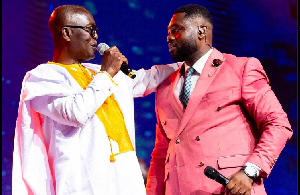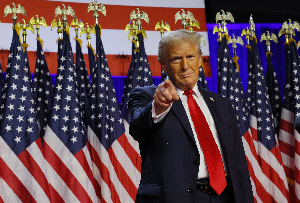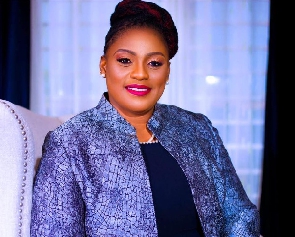Almost all the presidential candidates for the December 7 polls have taken their campaign trail up north of the country, considered very crucial for any decisive electoral victory in Ghana, to woo the electorate. The three northern regions - Northern, Upper East and Upper West of the country - seem to be enjoying the thrill of seeing their constituencies suddenly turn into a beehive of political activity. No wonder some opinion leaders and pressure groups had long agitated that the running mate to Professor John Evans Atta Mills, National Democratic Congress (NDC) presidential candidate, should come from what they call the "United States of the North".
Prominent among them is the Savannah Caucus, made up of eminent scholars and personalities such as Dr. Ben Abdallah, former PNDC Secretary of State, who played an active role in Rawlings' revolutionary government spanning 1981 to 1992.
The group at a press conference in Accra early this year stated emphatically that the electorate would only vote for any party that would choose its running mate from the north.
Many reasons were assigned for this. Some proponents explained that it could be a way of solving a political equation by bridging the north and south and Christian and Muslim communities. The other view, which is highly debatable, was that the "United States of the North" has been excluded from national politics for quite a long time and it is now its turn to assert its position. Others argue to the contrary that the people of the north have actively participated in the almost 20 years of Rawlings' rule out of which eight years of governance has been under a democracy and the trend must be sustained.
Development-minded people say that this part of the country is deprived, as indeed are most regions, and should therefore have an influential leader who would protect their interest and ensure the initiation of projects there. No wonder, four of the seven political parties contesting the forthcoming elections nominated their running mates from the north, while one has fielded a presidential candidate.
The NDC, the most organised and endowed, financially and logistically, has chosen Martin Amidu, Deputy Attorney General and Minister of Justice, and a northerner, as its running mate, catching most political pundits and the press on the wrong foot. Prior to this, there had in fact been much speculation in the media and some political circles that Dr. Obed Asamoah, Minister for Justice and Attorney General, was an obvious choice of a running mate to Professor John Evans Atta Mills, the NDC flagbearer.
The Daily Graphic, a state-owned newspaper, for example, reported that Dr. Asamoah had been given the nod to contest alongside Prof. Mills in view of his impressive records as an astute politician of immense experience and academic brilliance. This sparked off demonstrations for and against the alleged bid for Dr. Asamoah.
Mr Vincent Assiseh, NDC Press Secretary, quickly dismissed the story, saying it lacked credibility. But the lobbying persisted until Mr Amidu was chosen. In fact, Amidu's name had not even featured in the possible list of candidates for the vice-president slot. But the choice of Amidu gave credence to the fact that the northern factor has become a crucial issue in this year's general election. For the New Patriotic Party (NPP), unlike the NDC, the nomination of a running mate to its presidential candidate, Mr John Agyekum Kufuor, did not attract much internal lobbying except media speculation by mostly the private press. Madam Hawa Yakubu Ogede, a Member of Parliament (MP) for Bawku Central in the 1992 parliament, was highly tipped for the vice-presidential slot, perhaps for the sake of gender balance in Ghanaian politics or due to her short but impressive performance in parliament between 1992 and 1996. Eventually, however, Mr Kufuor nominated Alhaji Mahama Aliu, another northerner, to run the race with him.
Professor George Hagan, presidential candidate for the Convention People's Party (CPP), chose Alhaji Ibrahim Mahama, also a northerner, while Mr. Goosie Tanoh of the National Reform Party (NRP) picked Mr Joseph Kosiba, also from the north, as his running mate.
The People's National Convention (PNC), led by Dr. Edward Mahama, a northerner, as if to also balance the political equation, chose Mr. Bannerman Baah Ntim, a southerner, as his running mate.
The Great Consolidated People's Party (GCPP) and the United Ghana Movement (UGM) were the only parties that chose not to have anything to do with the northern factor. With this, the battle for the December 7 polls took off, with almost every party using the north as a launch pad in their campaigns. What is not certain is whether the fate of the political parties has anything to do with the northern factor.
Professor Mills and Mr Kufuor have dismissed the ethnic or northern factor as a crucial issue in the elections. Both have said that their nominations were purely based on merit and devoid of religious or ethnic considerations. Other political observers regard it as a mere political calculation, contending that the political parties need marketable candidates to clinch electoral victory in December.
But sceptics maintain that the parties have simply bowed to intense pressure from the Northern Caucus to boost their chances in the polls. This development has left the nation with a legacy, which seems to dictate that for any political party to stand a brighter chance of winning elections, it must balance the political equation by nominating its presidential candidate or running mate from the north.
No doubt, northerners have featured prominently in the country's political development, particularly in the search for democracy. But this is the first time in the political history of the country that individuals, opinion leaders and groups have consciously and openly agitated that a candidate from the north should be nominated to occupy the second most powerful seat in government. Cynics say the nomination of running mates of presidential candidates or substantive office holders from the north or any other region in Ghana to top political positions per se would not automatically bring electoral success and therefore development to such regions.
In reality, since independence, the people of the north, like other ethnic groups have played a significant role in both national politics and the socio-economic advancement of the country. Yet a lot of the rural communities have not seen any remarkable improvement in their lifestyles and therefore continue to request for a share of the national cake or their part of development. It is true the north has a reasonably large population of people and voters as do other regions it is not advisable for any particular region to foist conditions on party leaderships with regard to the choice of presidential or vice-presidential candidates.
The emphasis must rather be placed on the capability of the parties to perform and to speak with authority on issues rather than on ethnic or regional factors. After all, that is what most of the electorate now seem to be implying. It is equally important that candidates vying for the presidential or vice-presidential seat must prove themselves capable of solving Ghana's myriad problems spanning economic, education and health, among others.
The northern group and others who support the bid for a northerner as running mate for the NDC might also envisage the situation where a new government could abandon projects initiated by the NDC government. Examples of this political short -sightedness abound in Ghana's political history. Dr. Kwame Nkrumah's seven-year development plan, Busia's rural development programme, and Acheampong's Operation Feed Yourself programmes were all abandoned after their overthrow.
The PNDC/NDC rule, the longest in the country's history, has brought numerous development projects to the people some of which still need to be completed. It is however not logical to conclude that when President Rawlings leaves office and the NDC retains power, all development projects would be completed. It depends on what the government might consider as a priority project. But even then, one thing is clear in our current multiparty democratic system. Whatever is deemed a national priority will be determined not by only on party but all political parties represented in parliament.
The emphasis here should therefore be government and not a ruling party. One wonders how the President or his vice-president could influence the initiation of development projects in a particular area since it is parliament that gives approval for budgetary estimates of projects slated for a particular year. Again, how can the government initiate projects if the economy of the country continues to face internal and external shocks? Are development projects the only yardstick to assess a government's performance of a people's progress? These and many more questions point to the fact that we should as a nation have a national focus. It is therefore important to evolve a system that would lay the foundation for the socio-economic and political development of the country. The 1992 Constitution takes care of that. Apart from according the people their human and other rights, it also guarantees economic benefits.
Article 35 (7), which provides for "The Directive Principles of State policy" states that "as far as practicable, a government shall continue and execute projects and programmes commenced by previous governments".
Article 36 (1), also stipulates that "The state shall take all necessary action to ensure that the national economy is managed in such a manner as to maximise the rate of economic development and to secure the maximum welfare, freedom and happiness of every person in Ghana and to provide adequate means of livelihood and suitable employment and public assistance to the needy". What we need now are committed, dedicated and selfless leaders who would strive to ensure the socio-economic development of the people, irrespective of their religious or ethnic background.
We have to as a nation identify the important sectors of the economy such as roads, education, health and social welfare that determine our human resource base and initiate pragmatic measures to address problems in these areas. In fact, the nagging problems of poverty, diseases, ignorance, corruption, child abuse, teenage pregnancy, AIDS, drug abuse and street children seem to erode whatever gains we have made as a nation since independence. What shall it profit a nation if it is able to provide all physical infrastructures and loses its human resources.
Since the development of every nation depends on a sound educational system, we should initiate pragmatic measures to ensure that the youth acquire the requisite qualifications and skills needed for national development. Dr. Nkrumah, realising that the most important asset of every nation was the citizen, established free compulsory education, particularly in the northern regions of the country. This has enabled the nation to harness its human resources for development. Nevertheless, we continue to experience hiccups in our economic take-off as we are rendered virtually helpless with dwindling commodity prices and rising oil prices. The old notion of voting for people of our ethnic groups must thus give way to a new concept of leadership that inspires progress and vision, irrespective of what region or ethnic group one comes from, and takes this nation out of the economic malaise caused by disruptions in government and a worsening global terms of trade.
It is about time we allowed the arms of government - Executive, Judiciary, and the Legislature - as well as the media or Fourth Estate to work without interference from any individual or group of persons. Other state institutions should also be encouraged to work efficiently. As a nation, we must strive to create an elaborate and sustainable socio-economic and political programme, which would dictate to our leaders what our wishes, aspirations and needs are. This is the only way we can attain progress.
Prying into the origin of a president, vice-president or any other state official cannot guarantee sustained national development. Such behaviour only draws us back and must therefore be jettisoned.
Politics of Saturday, 11 November 2000
Source: GNA
















